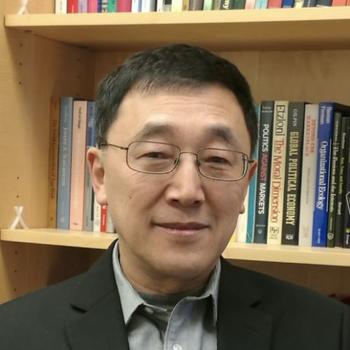Prof. Dr. Bai Gao

Fellow in the project "Conceptions of World Order and Their Social Carrier Groups“ (May 2025 - June 2025)
Short Biography
B.A. in Japanese language and literature, 1983, Peking University
M.A. in comparative higher education, 1986, Peking University
M.A. in sociology, 1990, Princeton University
Ph.D in sociology, 1994, Princeton University
Assistant Professor-Professor, 1993-present, Duke University
Visiting Professor at The University of Tokyo, Meiji University, Jacobs University, and Peking University
Visiting scholar at The University of Tokyo, Hitotsubashi University, Yokohama National University, Tokyo Keizai University, Cologne Max Planck Institute for the Studies of Societies
Project
The Conceptions of New International Economic Order and Domestic Political Economy: The Electric Vehicle Industry in China and GermanyThe international economic order established after World War II and further evolved in the post-Cold War era has apparently entered a stage of slow disintegration. The driving force behind this trend comes from the synchronization or conjuncture of three long cycles in history, including the pendulum movement of globalization, the hegemonic cycle, and technological revolution. The last synchronization of these three cycles that appeared in the first half of the 20th century led to the collapse of the Gold Standard, the breakout of World War I, the 1929-1933 Great Depression, the rise of protectionism in the world, the sharp ideological conflicts and confrontations among countries that adopted different solutions to the grand failure of the market, and the tragic ending of the Thucydides Trap in World War II. Since the 2008 global financial crisis, these three long cycles in history have again generated a new trend of synchronization or conjuncture, which is pushing the world toward a situation quite identical with what happened in a century ago.
The conceptions of new international order have been underway, and the major divide now is between those that aim to maintain the multilateral system under a unified world order and those that attempt to return to the two-bloc system witnessed during the Cold War.
In fact, among the three long cycles, technological revolution is the one that provides major dynamics, as it has brought about a group of new industries such as electric vehicle and drone. The disruptive technologies represented by artificial intelligence and alternative energy used by these industries have not only changed the competitiveness among nation states and affected the distribution of wealth, but also altered the balance of power between developed countries and developing countries and brought a strong sense of threats to the incumbent hegemon. Facing serious challenges, nation states have shifted their focus of economic governance from efficiency to national security, which has enormous impact on the conceptions of new world order. One recent development, which is identical to the 1930s, is the emerging trading blocs defined by ideologies and geopolitics.
A key question we must answer is whether this world can create a new order without going through the tragic path of the 1930-1940s.
Since the conceptions of world order are strongly affected by domestic institutions and economic structure, a study on the political economy surrounded the EU’s tariffs on Chinese electric vehicles can reveal the mechanism and conditions that shape the conception of a new international economic order. Both EU and China have strengths and weaknesses in their economic structure and institutions. Generally speaking, EU countries are strong in providing social welfare to their citizens and have better distribution policy that favor workers. At the same time, however, they are weak in information technologies and venture capital, the two key components critical to the innovation in electric vehicle industry. In contrast, China is strong in not only relatively low-labor cost and the state support via industrial policy, but also in its speed of innovation, new production organization that emphasizes vertical integration, gigantic market size, cutting-throat competition environment, and strong industrial clusters. At the same time, however, it is very weak in providing social welfare to its citizens, that has led to weak domestic demand. How can the interaction between the two sides that have come from quite different backgrounds eventually create a new international trade regime is essentially the research question in my project.
So far, I have worked on the Chinese side for nearly a year and have published a number of articles.
At Göttingen, I will study particularly the following aspects of the German automobile industry: how innovation is organized in the German automobile industry, what factors have prevented German companies from adopting disruptive technologies, what kind of reforms German companies plan to do in order to catch up with American and Chinese companies in the electric car industry, what kind of future trade regime German automobile industry wants to build, and finally, what kind of expectations German automobile companies have on their Chinese counterparts.
